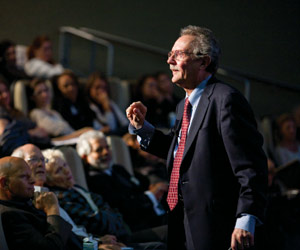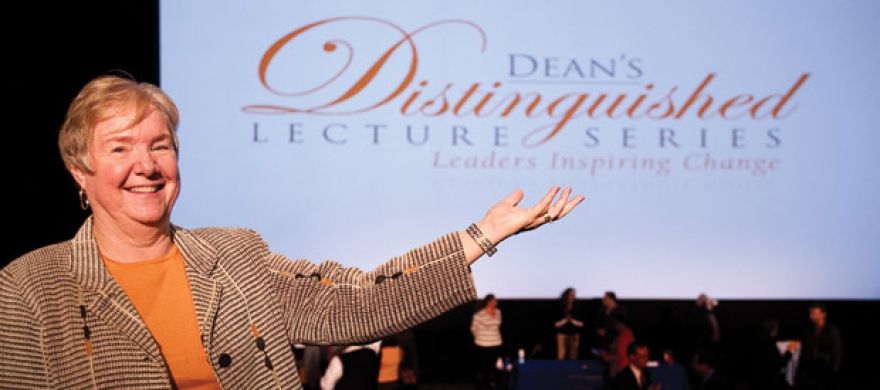Inspiring Change
The Graduate School of Education and Psychology debuts its Deans Distinguished Lecture Series with a journey to the business core of social enterprise.
When Jerr Boschee joined the Peace Corps in the late 1960s, he helped educate dozens of lower-caste young boys in a quiet Indian village. Although his presence affected their lives deeply, Boschee wouldn't truly learn the impact of his work until 30 years later.
When Boschee, now director of the Institute for Social Entrepreneurs, returned to the small village, he was reduced to tears as almost every single one of his students—now grown men with children of their own—gathered to welcome him back. What the men remembered most was how knowing that people around the world cared about their futures had impacted their sense of purpose and optimism.
 Boschee shared this story as the inaugural speaker of the Dean's Distinguished Lecture
Series at the Graduate School of Education and Psychology, offering an example of
the unseen impact one idea, group, or organization can have on the many "villages"
in need across the world. "Find a village of your own," he implored the audience of
students and alumni, "and keep it close to your heart."
Boschee shared this story as the inaugural speaker of the Dean's Distinguished Lecture
Series at the Graduate School of Education and Psychology, offering an example of
the unseen impact one idea, group, or organization can have on the many "villages"
in need across the world. "Find a village of your own," he implored the audience of
students and alumni, "and keep it close to your heart."
The new lecture series, dubbed "Leaders Inspiring Change," was created to bring leading agents of change to the University to discuss the challenges and opportunities of servant-leadership in communities across the world. Coinciding with the debut of the school's new MA degree in social entrepreneurship and change, Boschee's lecture was fittingly titled, "The Global Rise of Social Enterprise."
"An understanding of the social issues that confront our world is critical," says Margaret Weber, GSEP dean and chair of the new social entrepreneurship and change program. "Boschee presented the concepts of the social issues in relationship to business practice. The highlight of the event was the breadth of the 'social entrepreneurship' concept, incorporating both domestic and global enterprises."
Before Boschee took to the podium, Weber asked the attendees what it means to be a citizen of the world and posed the question, "Who will be the agents of change on great projects to eliminate poverty?" Great projects, she told the audience, build a better world for future generations, transcend personal ambition, and are led by inspirational visionaries.
As an insider known as one of the founders of the social enterprise movement worldwide—Boschee was named in the NonProfit Times Power & Influence Top 50 list for nonprofit sectors three times in the last decade—he was the ideal speaker to kick of the series and tackle this topic. The former journalist and entrepreneur now devotes himself to inspiring fellow visionaries through seminars, workshops, and coaching services as part of the Institute for Social Entrepreneurs. His lecture focused on how the social enterprise industry evolved, examples of failed and successful social enterprises from a dozen countries around the world, and the unexpected leaders of change behind the successful enterprises.
The fundamental idea behind social enterprise is that problems affecting a community, from environmental hazards to low standards of education, are positively affected by business organizations with socially driven agendas. "Social enterprises go beyond the traditional concept of corporate social responsibility," says Boschee. "They directly confront the major unmet needs of society through businesses themselves rather than grappling with them indirectly through socially responsible practices, such as corporate philanthropy, equitable wages, and the use of environmentally friendly raw materials."
Boschee highlighted some of the best known examples, such as the microfinance organization Grameen Bank in India, which provides small business loans to poor-yet-capable communities, and the Delancey Street Foundation, which reintegrates former drug users and criminals into employed society by operating small businesses that are managed and run by the residents.
"Boschee shared some inspiring examples of current social enterprises that started from one person's idea to make something better in their village or community," says Khristine Valladolid (MA '10), who graduated from the school's marriage and family therapy program in May. "They really put things in perspective about how ideas can proliferate into real and tangible resources for the less fortunate."
Most of the example organizations operate with bottom lines and need to be in large part financially independent in order to survive. It is risky, Boschee warned his audience, "to live by the rules of business." The reward, however, for good business strategy and perseverance comes when a social enterprise is successful and large numbers of people benefit from that success.
"With the recession limiting what people are able to give to nonprofits right now, there's a greater need for social entrepreneurs to help provide for consumer needs while tackling societal needs," adds Molly Drobnick, a student of the new social entrepreneurship and change program. "Boschee provided a real-world view of the challenges social entrepreneurs face, while emphasizing how rewarding it is to creatively alleviate social issues through social enterprise."
The inaugural Dean's Distinguished Lecture opened the series on a high note. As Boschee led the audience on a journey to explore what social enterprise has done so far and what it can do in the future, he built upon a simple, tangible idea from Weber's introduction: "Dare to dream to inspire change in community."
Watch video footage of the lecture at gsep.pepperdine.edu/news-events/events/deans-lecture.
Learn more about the masters of arts degree in social entrepreneurship and change at gsep.pepperdine.edu/masters-social-entrepreneurship-and-change[BROKEN LINK].
